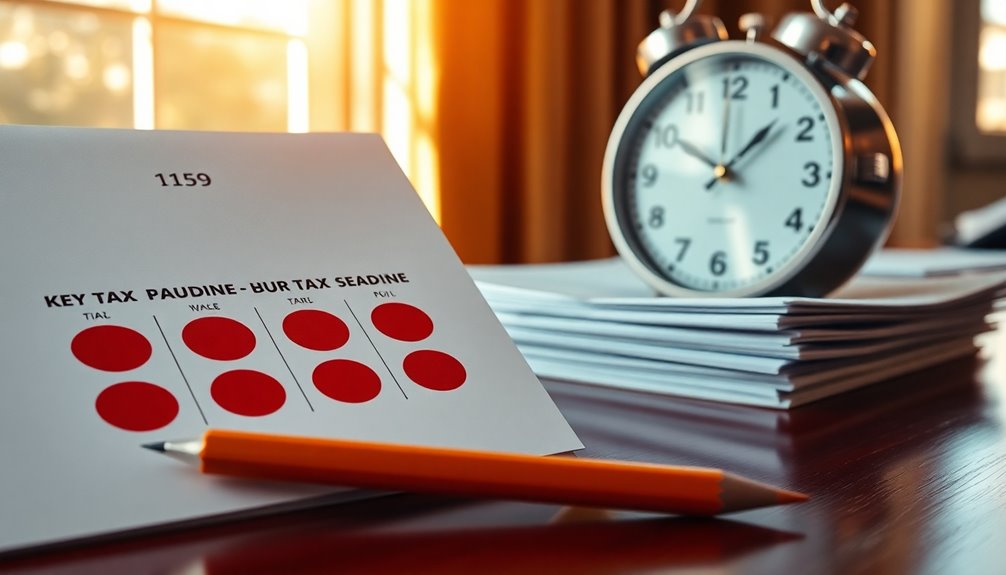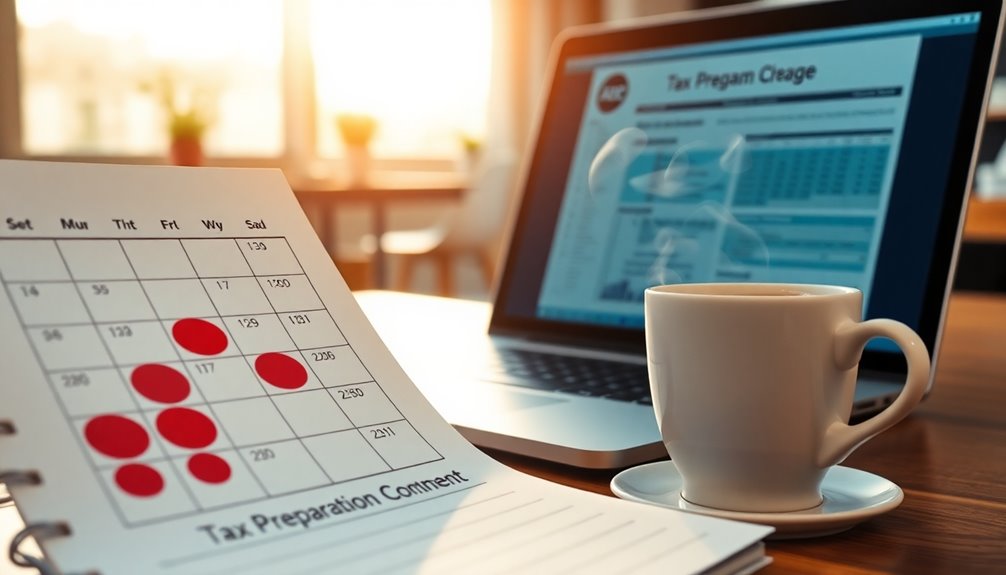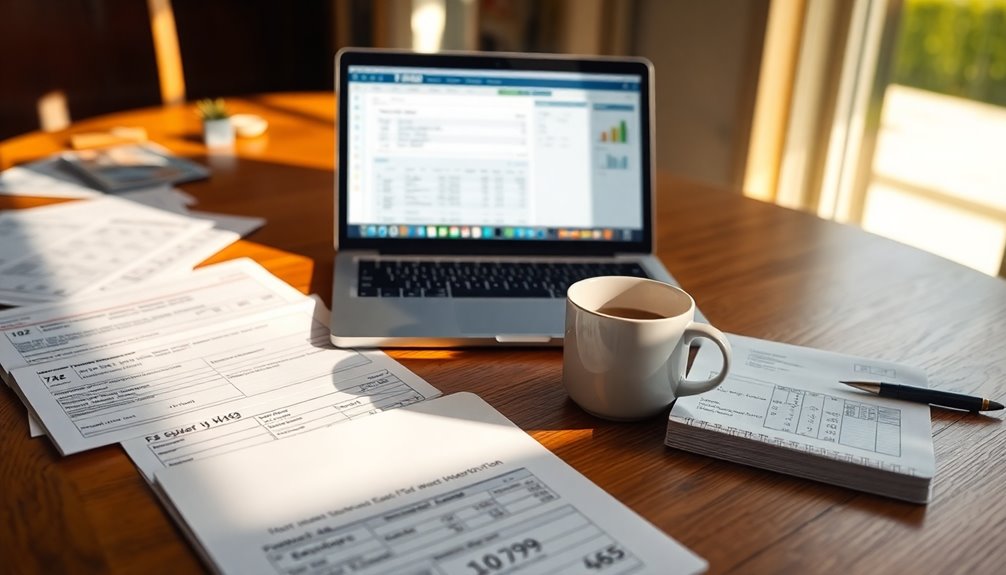You can usually file your taxes as early as late January each year, once the IRS opens the tax season. Historically, the IRS typically begins accepting returns around this time, often confirming the exact date in early January. To get ready, gather your documents like W-2s and 1099s, and consider preparing your tax software beforehand for a smoother process. Filing early can help you receive your refund faster and reduce stress. Plus, it gives you ample time to review your finances. Stick around to discover tips for maximizing your filing benefits and the best ways to stay organized.
Key Takeaways
- Tax filing season typically begins between January 15 and January 31 each year, with the exact start date confirmed by the IRS in early January.
- You can prepare your tax documents and software anytime before the filing season starts to streamline the process.
- W-2s and 1099s must be received by January 31, 2025, to file your taxes accurately.
- E-filing can be done as soon as the IRS begins accepting returns, usually in late January.
- Early filing allows for quicker refunds and better preparation for potential tax payments.
Tax Filing Season Start Dates

The tax filing season typically kicks off between January 15 and January 31 each year, with the IRS confirming the exact start date in early January. For 2025, you can expect this season to start within that timeframe. Historical trends suggest that the IRS often begins accepting returns in late January, as seen in 2024 when the season officially started on January 29. While you can't file your returns until the IRS opens processing, you can prepare your documents ahead of time. Tax software and professionals will hold your returns until the IRS is ready to accept them. Keep in mind that you'll need to receive important documents like W-2s and 1099s by January 31, 2025. Additionally, if you're making estimated tax payments, those are due by January 15, 2025. Federal tax filing deadlines are set for April 15, 2025, ensuring you have ample time to submit your returns.
Preparing for Tax Filing

As tax season approaches, getting organized can make a big difference in how smoothly the filing process goes. Start by setting up your tax software early. Download the latest version and familiarize yourself with its features.
Next, ensure your technology is up to date—check your scanners, printers, internet speed, and anti-virus software to avoid any hiccups during filing.
Don't forget to renew your Preparer Tax Identification Number (PTIN) if you need one. Review any changes in tax laws that might impact your return this year. It's a good idea to reach out to past clients and engage potential new ones to keep your network strong.
Organizing your tax information is crucial. Categorize your documents, gather receipts, and ensure your records match your tax forms. Reference last year's tax return for comparison, and stay alert for any new deductions or credits you might qualify for due to life changes. Early client outreach can also enhance your chances of a smoother filing experience.
Lastly, schedule appointments with tax preparers early to avoid the rush. Starting the filing process now can help you correct any mistakes and reduce stress come deadline time.
Key Documents to Gather

Gathering key documents is essential for a smooth tax filing experience. Start by collecting your personal information, including a government-issued photo ID like your driver's license, your Social Security number, and your spouse's details, such as their full name and Social Security number.
Don't forget the dates of birth for your dependents, too.
Next, focus on income documents. You'll need Forms W-2 from your employers, as well as any 1099-NEC and 1099-K forms if you're self-employed or receive electronic payments.
If applicable, gather your unemployment benefit statements (1099-G), retirement income documents (1099-R), and any forms related to interest, dividends, and capital gains income.
For deductions and credits, collect Form 1098 for mortgage interest, real estate and personal property tax records, and charitable donation receipts. Organizing these documents now can maximize potential refunds, so make sure to keep everything in order.
Medical expenses and childcare records, including your daycare provider's tax ID number, are also crucial.
Lastly, gather other relevant documents like last year's tax returns, business expense records, and educational expense statements (Forms 1098-T and 1098-E).
Organizing these documents now can save you time and stress later!
Benefits of Early Filing

Filing your taxes early offers numerous advantages that can make the process smoother and more beneficial for you.
First, you'll likely receive your tax refund sooner. By filing electronically and opting for direct deposit, you can expedite the refund process and get your money before the IRS gets busy later in the season. This extra cash can help pay bills, fund travel plans, or boost your savings, reducing the need for costly short-term loans.
Additionally, early filing gives you extra time to prepare for any tax payments, allowing you to avoid late penalties and interest. If you can't pay your entire balance at once, the IRS offers payment plans to ease the burden. Early filing also provides you with the opportunity to maximize your potential tax liabilities, giving you better control over your financial situation.
Filing early also protects you against identity theft and refund fraud. By locking down your tax data, you prevent others from filing fraudulent returns using your Social Security number, reducing the risk of a stressful identity verification process.
Lastly, filing early reduces stress and improves accuracy. You'll have ample time to gather necessary documents, catch mistakes, and understand any tax law changes that may affect you.
Deadlines and Extensions

Early filing can streamline your tax experience, but it's also important to understand the specific deadlines and extension options available. For the 2024 tax year, the IRS is expected to begin accepting returns in late January. While you can prepare your tax return as soon as you have all necessary documents, like W-2 and 1099 forms, be aware these are typically issued by January 31. The standard deadline for filing individual federal tax returns is April 15, unless it falls on a weekend or holiday. If you need more time, you can request an automatic six-month extension by submitting Form 4868 before the deadline, pushing your filing date to October 15. Additionally, keep in mind that individual tax returns are due on April 15, 2024, for the upcoming tax season.
Remember, an extension only gives you more time to file; you still need to pay any taxes owed by the original deadline to avoid penalties. If you're a business owner, you can request a similar extension with Form 7004. Keep in mind that life events can also justify requesting an extension, but always prepare to estimate and pay taxes owed to sidestep penalties and interest.
Submission Methods

When it comes to submitting your tax return, you have two primary options: e-filing and paper filing. E-filing typically starts in late January of the year following the tax year, with the IRS accepting returns around mid- to late January.
If you choose e-filing and opt for direct deposit, you'll enjoy the fastest refund, often within 21 days. Plus, e-filing minimizes the risk of fraudulent returns because it prevents others from filing before you. Early filing also facilitates the early discovery of potential deductions or credits, allowing you to maximize your refund.
On the other hand, paper filing can take several weeks longer for processing and is generally slower and more error-prone. While the IRS recommends e-filing for quicker results, you can still file on paper if you prefer.
However, keep in mind that mailing your return can be time-consuming and less secure, and it doesn't offer the same level of fraud protection as e-filing.
Ultimately, your choice should align with your comfort level and urgency for your refund. Whichever method you choose, make sure you've gathered all necessary documents to ensure a smooth submission process.
Tracking Your Refund
As you await your tax refund, tracking its status can provide peace of mind and help you plan your finances better. To do this, you can use the IRS "Where's My Refund" tool on their website or the IRS2Go mobile app. Both methods require your Social Security number or ITIN, your filing status, and the exact whole dollar amount of your refund.
Remember, you can only track your refund after your tax return has been filed.
Once you submit your return, you should see your refund status updated about 24 hours later if you e-filed. Most refunds get issued within 21 days of electronic filing, but keep in mind that paper returns take longer to process. This is a significant improvement from the past when refunds often took many months to receive.
The IRS updates their systems once every 24 hours, so checking frequently won't speed things up.
If you prefer to call, use the automated refund hotline at 800-829-1954 for quicker access, avoiding long wait times. For state tax refunds, contact your state's taxation department.
If online methods aren't providing enough information, don't hesitate to reach out to the IRS for assistance.
Frequently Asked Questions
Can I File My Taxes Before Receiving All Documents?
You can file your taxes before receiving all necessary documents, but it's risky.
If you do, you might end up with inaccuracies that require amendments later. It's better to wait until you have everything—like W-2s and 1099s—to ensure your return is accurate.
Rushing the process can lead to missed deductions or even an audit.
Take time to organize your documents and file correctly for a smoother tax season.
What if I Miss the Early Filing Period?
If you miss the early filing period, you'll face penalties and interest on any unpaid taxes.
The failure-to-file penalty starts accruing immediately, reaching up to 25% of your owed taxes. Interest on the unpaid balance also accumulates until you pay in full.
To lessen the impact, file your return as soon as possible and pay whatever you can. You might consider setting up a payment plan with the IRS to manage your balance.
Are There Penalties for Filing Early?
There aren't any penalties for filing your taxes early.
In fact, getting your return in sooner can actually benefit you. You'll have a greater chance of receiving your refund quicker, which can help with your financial planning.
Plus, filing early gives you more time to address any mistakes or gather necessary documents without the pressure of a looming deadline.
Can I Amend My Return After Filing Early?
Yes, you can amend your return after filing early.
Once the IRS processes your original return, you can use Form 1040X to make changes. There's no need to wait for your refund, but it's often recommended to do so.
Just remember to include any new documents and clearly explain your changes on the form.
Make sure to file within three years of your original filing date for the amendment to be valid.
Will Filing Early Affect My State Tax Return?
Filing your state tax return early can positively affect your refund timing. By submitting your return sooner, you might receive your state tax refund faster, similar to federal refunds.
Plus, it helps protect against identity theft, as your Social Security number gets locked in.
Early filing also gives you extra time to organize your documents, reducing last-minute stress and minimizing the chances of mistakes that could lead to penalties.
Conclusion
Filing your taxes early can save you stress and help you get your refund sooner. By knowing the start dates and gathering your documents ahead of time, you're setting yourself up for success. Remember to keep track of deadlines and explore your submission options. With a little preparation, you can breeze through tax season and enjoy the benefits of early filing. So, don't wait—get started on your taxes today!









